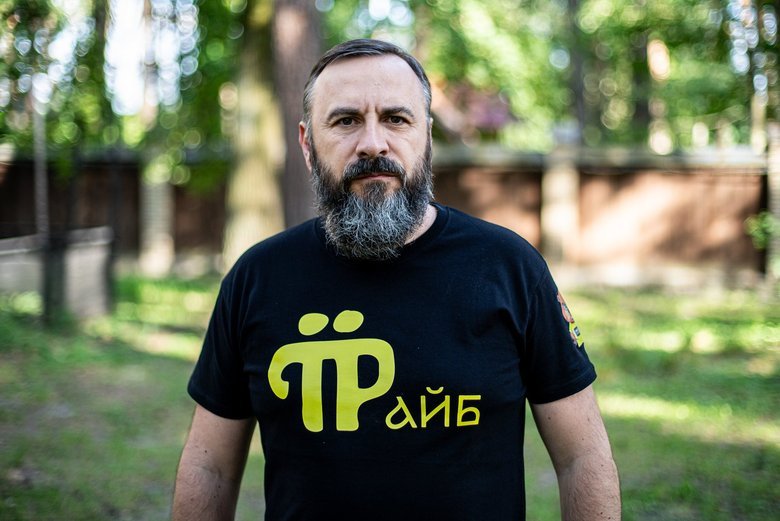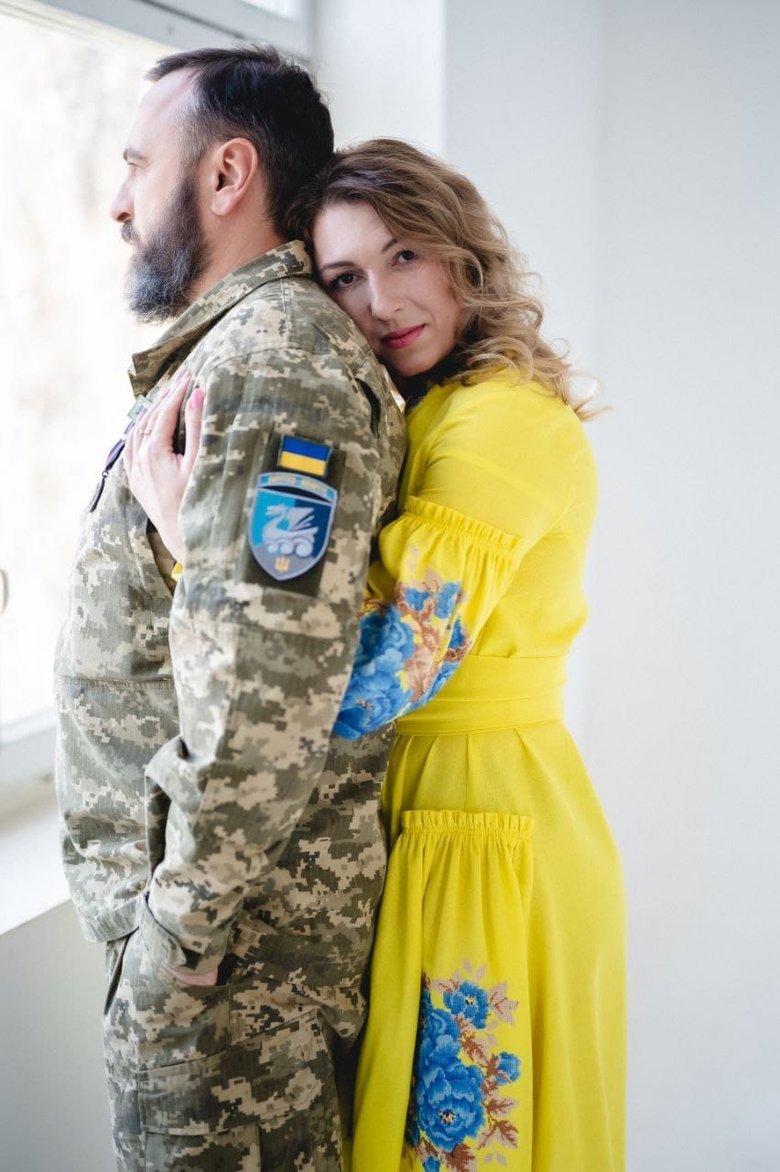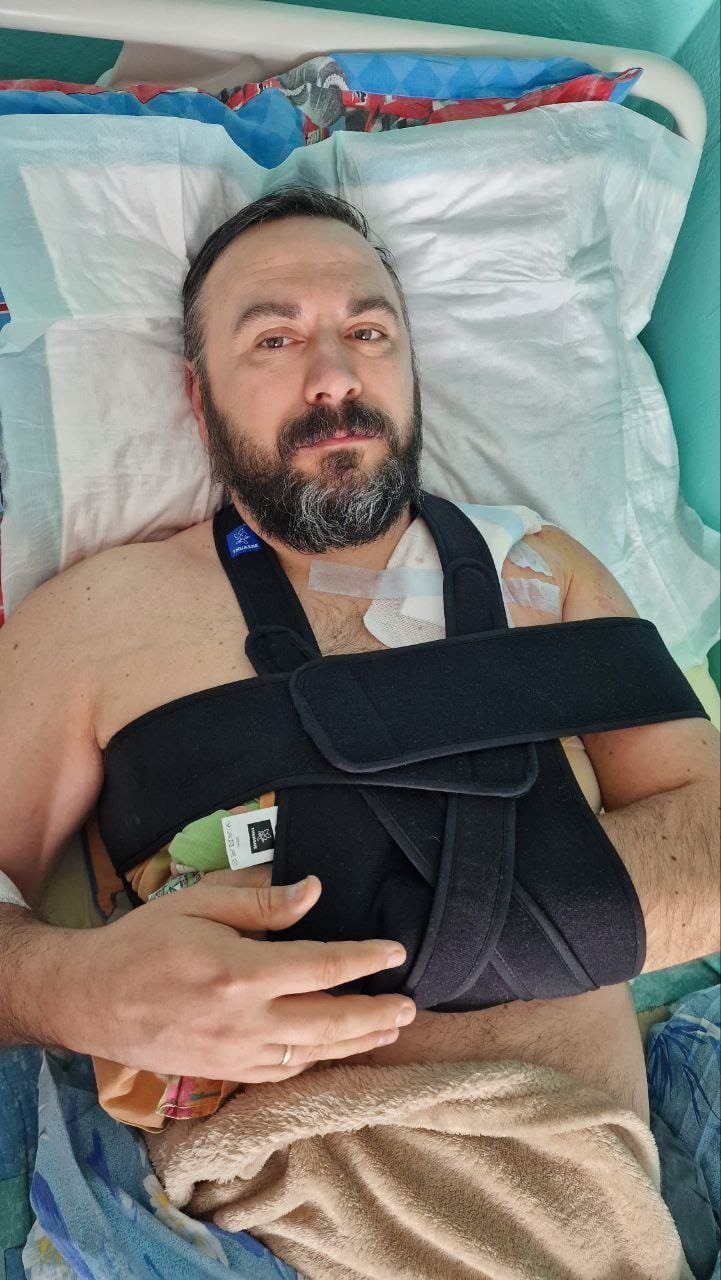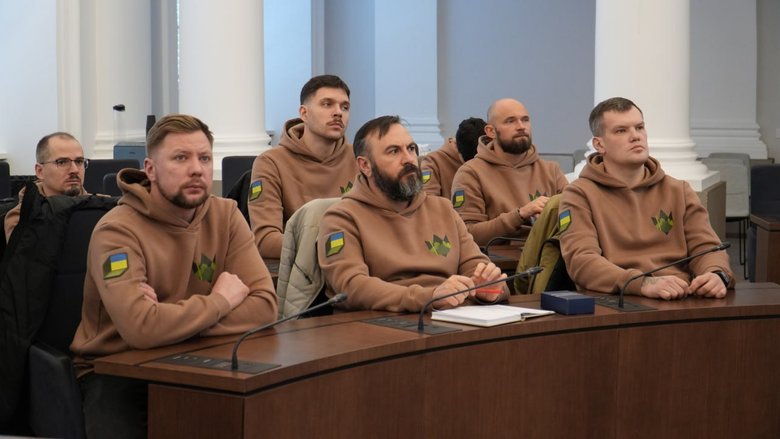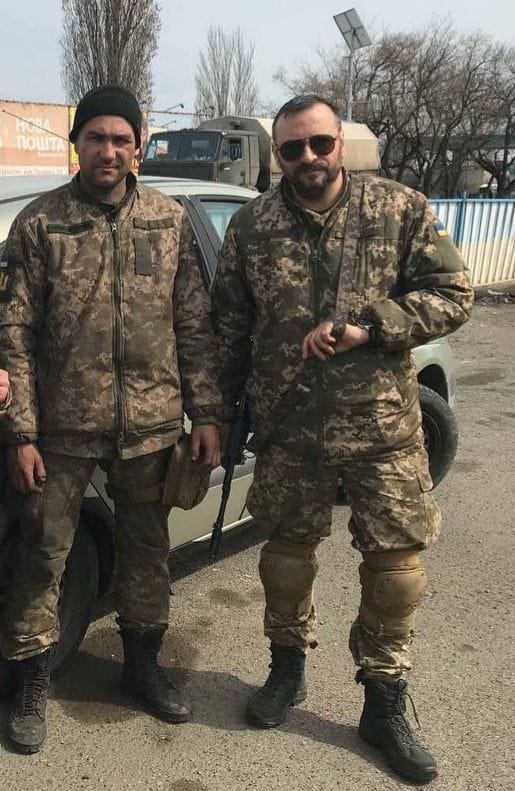Dmytro Hnatiuk: I saw guys with amputations, with all kinds of injuries. And they were so full of life, so active. It really motivated me!
After returning from the war, suffering a severe injury, and undergoing long rehabilitation, Marine Dmytro Hnatiuk began a new battle. Having founded a veterans’ council in Mykolaiv, he is trying to change the system from within: to overcome bureaucracy, direct war veterans to places where they will truly receive help, and make their voices heard by the authorities.
Dmytro joined the Public Council at the Ministry for Veterans Affairs, is studying in the "Tribe" educational project, and aims to expand the network of veterans’ councils across Ukraine. Why he is doing this — in this Censor.NET publication.
Dmytro Hnatyuk woke up to explosions on the morning of 24 February 2022. He realized the war had begun, he had been preparing for it, warning family and friends, and had packed his military rucksack. "My wife knew she had to evacuate the children which she ‘successfully’ didn’t do on the very first day. I’m still a little upset with her about that," Dmytro recalls with a smile. He told his wife: "Heat up some food for me and drive me to the military enlistment office."
He joined the 36th Separate Marine Brigade: "They formed us up and ran a quick medical check. ‘Any complaints? No? Then you’re healthy, move out.’ We didn’t complain back then. We were told straight away that we were going to Mariupol because hell had already broken loose there. The next day we were already in the fields in the Donetsk direction. Of the guys who set off with me, only a handful came back. Later we tried to piece together how it all happened, because it all seemed to merge into one very long day. But at the start it went like this, they brought us to some village, issued uniforms, assigned roles (I was appointed commander of a marine air assault squad), and said, "the enemy is there." And that was the beginning."
The first reinforcement group managed to enter Mariupol; the second, all were killed; the third, which included Dmytro, was already fighting on the city’s approaches, so he never made it into Mariupol itself. The Russian army outnumbered and kept outflanking Ukrainian forces, so we were encircled more than once and had to break out repeatedly:
"After the battle in the village of Zatyshne in the Volnovakha district, which lasted more than 12 hours, I walked another 12 kilometers on foot while breaking out of the encirclement. I carried 50 kilograms of gear and our badly wounded brothers-in-arms. We ended up in the enemy’s rear, where half the village had already been taken. I always kept my wife’s photo close to my heart. She was the one who saved and protected me. I had promised her I would come back and I usually keep my promises."
Dmytro recalls that it was bitterly cold. They moved at night along the road into an already occupied village, very close to Russian positions:
"By then I didn’t care anymore. I walked down that road and cursed. Everything was frozen. Maybe they thought I was one of theirs. They didn’t shoot me. I passed within ten meters of them and made it back to our lines. When I did, the guys were astonished: ‘How did you get through?!’ And I said, ‘On foot.’"
Units of the 36th Separate Marine Brigade were conducting a mobile defense, gradually withdrawing under fire. The enemy kept trying to encircle them, the veteran explains. There was no communications. They pulled back to Vuhledar. That is where Dmytro Hnatiuk was wounded. An enemy tank hit the building where he and his brothers-in-arms were based:
"There were eight wounded right away. A fragment struck my jaw and my arm. Something was running down me, but on adrenaline I ignored it. We were saving heavy wounded, with my injured arm I was tossing them onto a tractor for evacuation. By night I couldn’t open my eyes. The guy with me also took a fragment to the kneecap. He couldn’t bend his leg. In the morning we hobbled off like this: he was limping ahead, and I put my hand on his shoulder and walked, because I couldn’t see anything myself."
Dmytro was without sight for three days. In the hospital, when he finally opened his eyes, he was overjoyed that he could see. He also felt severe pain in all his teeth. It turned out a fragment had struck his trigeminal nerve:
"It’s the most intense pain a person can have. If I had to compare it, it feels like a red-hot needle hooked up to 220 volts: shooting, burning, and stabbing all at once."
He was on constant painkillers. Treatment lasted more than eight months. After the wound, Dmytro was assigned a Group II disability. He says it was a hard period because he felt useless:
"I was just a vegetable. Lying there, drooling. The only person to whom my life truly mattered was my wife."
She tailored treatment protocols and searched for information. But in my case only supportive therapy is available. I’m still constantly on painkillers. I can speak at a normal pace for two to three hours, and then I start sounding like I’ve had cognac: my tongue gets tangled and my jaw stops working. I can chew only on one side of my jaw, but I’ve more or less gotten used to it."
Then, Dmytro says, he gradually learned to live with the pain. After he was discharged from the army, he returned home. His circle of communication shrank drastically, Dmytro admits: most colleagues and acquaintances went abroad, and only a few were mobilized:
"I stayed at home for almost a year. My wife started monitoring war veterans’ programs. She found a program for people with disabilities and we went together. I wouldn’t have gone on my own back then. That pulled me out. I saw guys there with amputations, with various wounds and they were so full of life, so active. It motivated me so much! I found myself among my own, it charged me up and gave me energy."
After that first positive experience, Dmytro kept taking part in war veterans’ programs. He found a job with a charitable foundation through Veteran Hub, founded his own NGO, the Ukrainian Veterans’ Center and learned to speak in public:
"Speaking was very important to me, because I had stayed silent for more than eight months. At first I stuttered badly and couldn’t form a thought for a long time; I was ashamed of it. Even now it happens sometimes. A phone game helped me, the kind where you build words from letters and I would pronounce the words letter by letter. I basically became a champion at it. It was hard work on myself, but it’s worth it. And now, for me, being able to speak is simply a gift!"
Dmytro Hnatiuk initiated the creation of a war veterans’ council under the Mykolaiv Regional Council because he saw the need to improve dialogue between veterans and the authorities. The first achievement was a veterans’ roadmap compiling local and national programs available to those returning from the war. When drafting the roadmap, they verified that the initiatives were actually functioning rather than merely written down on paper. It is currently awaiting print.
And a few months ago, a fellow soldier of Dmytro’s who is currently fighting nominated him to the Veterans Council at the Ministry for Veterans Affairs, to represent Mykolaiv region at the national level in his stead. As Dmytro says, he did so because he saw Dmytro’s active stance and support for veterans. This body is advisory, it can only recommend changes, but according to Dmytro, they still manage to influence the ministry’s work:
"Of course, there are nuances, but we do have some influence. When there was an attempt to disband the Ministry for Veterans Affairs, our pressure and publicity did their job. We preserved it. My candor is not criticism; it is an attempt to convey a veteran’s pain and experience. I want the line ministry, and everyone involved in veterans’ issues, to truly hear us."
Photo: CHESNO Movement
Dmytro Hnatiuk proposed that the ministry open modular rehabilitation centers for war veterans across the regions. He says that ten pilot centers have already been launched throughout Ukraine, but Mykolaiv region, which the war veteran cared about most, was not included in the pilot project. So now, Dmytro and his wife Veronika are independently looking for donors to open such a center:
"Unfortunately, (Mykolaiv region) wasn’t included, though I had high hopes for it. But the project is very important. As a builder, I designed these modular veteran spaces — each 500 square meters, costing 24 million hryvnias, and built in just two and a half months. They can be constructed anywhere they’re needed. I had talks with the Come Back Alive Foundation — they could help with equipment, inventory, and gym machines. But things aren’t moving as quickly as I’d like, so I’m looking for donors now."
Officially, meetings of the Veterans Council at the Ministry for Veterans Affairs take place almost weekly, but Dmytro says he tries to communicate with the Minister for Veterans Affairs, Nataliia Kalmykova, through other channels:
We raise issues on social media and exchange messages with Ms. Nataliia. I write my thoughts, and she comments, sometimes explaining, ‘I’m not omnipotent.’ I understand she has her constraints, but for me, veterans are the priority."
Dmytro says he would like to build a system of interaction with the authorities where requests flow from veterans in local communities directly to government offices and that veterans’ council members in communities should be elected by vote. When asked if he considers the Ministry for Veterans Affairs insufficiently effective, he says that while positive changes exist, they must be systemic rather than isolated. For instance, the ministry is now working with the Pension Fund to ensure proper application of the law governing temporary disability benefits for people with war-related disabilities, as veterans currently receive reduced payments due to inconsistencies in legislation:
"They do hear us to some extent. For example, they’re now sorting things out with the pension funds, because there are legal loopholes or reluctance to implement the law. It’s a kind of paper war. The minister and her deputies are under huge pressure. When you look at it from the inside and imagine yourself in their place, you understand why it’s so difficult. Public service isn’t like business, where you invest time and get a return. Sometimes we clash heads, but eventually we find consensus and move forward. Many issues are solved on a case-by-case basis, but not systematically and that’s what needs to change. Fortunately, more and more active war veterans are starting to influence the process."
Dmytro Hnatiuk also speaks about the systemic changes society itself needs. The veteran is convinced that people must learn to respect not only those in uniform or with visible wounds, since many veterans wear civilian clothes and carry invisible disabilities or effects of injuries:
"Everything in life changes. Our comrade in arms brothers and sisters in arms who return from war change. Civilians in the rear change too, as missiles hit their towns as well. The first thing that must exist is humanity, in simple things. Don’t park in a disabled spot if you don’t have the right. Let a war veteran or service member go first in line. Once, a woman yelled at me, ‘You don’t look like a war veteran!’ I had to show my ID, though my wife told me not to, I don’t owe anyone proof. Another time, I went to a public service center and suddenly lost my speech. I stood in front of the employee, unable to say a word. She wasn’t trained for that situation. I tried to write on a piece of paper, then gave up and left. But after that, the center realized such situations can happen, because we raised it publicly. That’s how we educate people through our own experience. Among soldiers, too, there are imperfect people, even rude ones. We’re all different. But we all need humanity and mutual respect. For war veterans, respect is even more important than privileges. A simple smile is respect. And not looking away from amputations or scars, that’s respect too."
Anna Tokhmakhchi, Amnesty International Ukraine
Photos provided by Dmytro Hnatiuk and CHESNO movement

